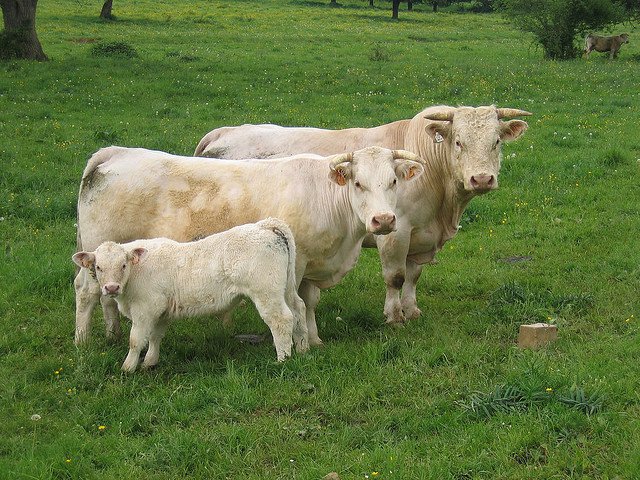You’re sitting at a picnic table on a warm summer evening, the grass is soft, and fireflies are loping in the air. Someone hands you a hamburger just off the grill, plump in a sesame seed bun with tomatoes and pickles.
It smells and looks delicious. It’s nearly impossible to resist.
But here are seven reasons why you should resist not just that hamburger, but also all red meat in general — steak, sausages, roast beef — all of it.
1/ Red Meat Is Bad For Your Health

Red meat makes you more likely to die from eight diseases — cancer, heart disease, respiratory disease, stroke, diabetes, infections, kidney disease, and liver disease.
2/ Livestock Accelerate Climate Change

There are an estimated 1.5 billion cows on the planet burping up over 40 billion gallons of methane a day.
Agriculture in general generates around 15%-20% of global emissions, but the bulk of it comes from livestock because methane warms the planet at rate that is 25-34 times greater than carbon.
Read More: Americans Are Eating 20% Less Beef in Huge Win For Earth
Then there are the carbon emissions involved in transporting, storing, and preparing red meat.
If everyone in the US started replacing red meat with beans, for example, then emissions would plummet and the commitments made under the Paris climate agreement would be within reach.
A 2014 study found that giving up red meat is more effective at reducing your carbon footprint than giving up the use of cars. Now that’s food for thought.
3/ Factory Farms Pollute Local Environments
Bacterial and other forms of runoff from factory farms are some of the biggest polluters of local waterways, which can end up ruining drinking water and making humans ill.
Factory farms also cause poor air quality, which can lead to respiratory problems.
4/ Factory Farms Treat Cows Terribly

Cows are as emotionally complex as dogs and cats, yet factory farms subject them to brutal, miserable lives where they are constantly in pain, confined to tight spaces, forced to eat enormous amounts of hormone- and antibiotic-suffused food, abused, and separated from their loved ones.
Read More: Scientists Are Making Grass So Cows Burp Less Because Climate Change
5/ Raising Livestock Drives Deforestation

Agriculture takes up 40% of the Earth’s land surface, and most of this land is dedicated to raising livestock and growing livestock feed. Cows are bigger, eat more, and produce more waste than other animals, making them the most land-intensive livestock.
Beef production, for example, takes 28 times more land to produce than chicken or pork, and 160 times more land compared to staple crops like wheat or rice.
Further, to create grazing land for livestock, farmers usually cut down forests. In the Amazon 80% of deforestation is attributable to cattle ranching.
Read More: Brazil’s Rainforests Are Being Decimated — and One Country Wants to Do Something About It
Each year, 13 billion hectares of forest area are lost to make way for agricultural uses, especially to raise and feed livestock.
6/ Livestock Use Up Too Many Resources

Raising cows requires an enormous amount of food and water. Nearly 36% of the world’s ice-free land is used for livestock grazing and an additional 33% of croplands are dedicated to growing livestock feed.
Cows also have a huge water footprint. To produce one pound of beef, 1,799 gallons of water are needed, compared to 576 gallons for one pound of pork, and 108 gallons for a pound of corn.
7/ The Alternatives Are Now Really Good
It just doesn’t make much sense anymore to keep eating red meat — the costs are known and they’re real.
The good news is that there are countless delicious alternatives.
Read More: 9 Ways Veganism Is Helping the Planet
Next time you’re at a barbecue, you don’t have to worry about missing out on a juicy burger or a satisfying experience.
Lab-grown burgers sizzle on the grill, beet-bean-quinoa based burgers crisp up nicely, and mushrooms are always delicious, just to name a few options.
Best of all — you'll know that each bite isn’t hurting the planet, your health, or animal welfare.